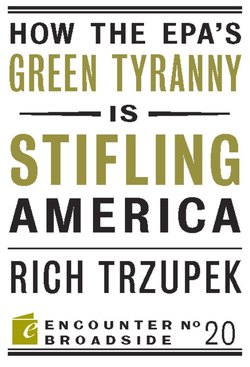How the EPA?s Green Tyranny is Stifling America

Реклама. ООО «ЛитРес», ИНН: 7719571260.
Оглавление
Rich Trzupek. How the EPA?s Green Tyranny is Stifling America
Отрывок из книги
ENCOUNTER BROADSIDES: a new series of critical pamphlets from Encounter Books. Uniting an 18th-century sense of political urgency and rhetorical wit (think The Federalist Papers, Common Sense) with 21st-century technology and channels of distribution, Encounter Broadsides offer indispensable ammunition for intelligent debate on the critical issues of our time. Written with passion by some of our most authoritative authors, Encounter Broadsides make the case for liberty and the institutions of democratic capitalism at a time when they are under siege from the resurgence of collectivist sentiment. Read them in a sitting and come away knowing the best we can hope for and the worst we must fear.
Unfortunately, the hard reality of the situation today is very different and far from encouraging. Cap and trade may be dead, but that doesn’t mean that the EPA and other governmental entities aren’t pursuing other ways to sabotage America’s ability to use cheap, abundant fossil fuels in order to generate power, which is a vital component of fueling economic recovery. The fact is that the Obama administration and its liberal allies are conducting a full-scale assault on America’s energy sector, and on our industrial base, in the guise of environmental protection.
.....
But there was another side to the amazing, and amazingly rapid, success stories called the Clean Air Act and the Clean Water Act. Meeting the requirements of both pieces of legislation required a new kind of support infrastructure, and what we have come to call “green jobs” were born. This included everything from the Sierra Club lobbyist pushing Congress to pass more legislation, to the company that makes state-of-the-art pollution-control devices, to the armies of federal, state, and local bureaucrats who make sure that everyone follows the rules. Law firms sprouted environmental departments to help companies that ran afoul of the EPA, and consultants (like me) began to earn a living by guiding businesses through the tangle of regulations that grew more confusing each year.
As is always the case, once you build up a multifaceted industry like the environmental industry, it’s extremely difficult to tear it down or even shrink it a little. This is particularly true when government alone has the power to reduce the size of an industry that – like any service industry – does nothing to create wealth but instead saps capital generated by wealth creators. Absent government mandates, the environmental industry would be a fraction of the size that it is today, for there are few free-market forces that would support such an industry.
.....